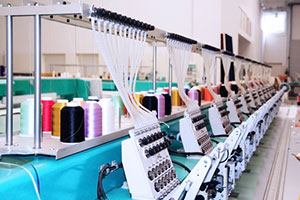Textile Industry Injuries
 Many thousands of workers are employed making fabric and yarn for clothes and other items. Textile mill production workers work on or near the production floor. They stand for a long period of time and bend for extended periods so that they can make sure that the machines are working. In some cases, there are airborne particles of fiber or excessive noise that may also cause serious injuries. If you suffer textile industry injuries, you may be entitled to obtain workers' compensation benefits. At Pulgini & Norton, our knowledgeable Boston workers’ compensation lawyers can answer your questions and may be able to represent you in your claim.
Many thousands of workers are employed making fabric and yarn for clothes and other items. Textile mill production workers work on or near the production floor. They stand for a long period of time and bend for extended periods so that they can make sure that the machines are working. In some cases, there are airborne particles of fiber or excessive noise that may also cause serious injuries. If you suffer textile industry injuries, you may be entitled to obtain workers' compensation benefits. At Pulgini & Norton, our knowledgeable Boston workers’ compensation lawyers can answer your questions and may be able to represent you in your claim.
There are steps that an employer may take to make its employees safer in a textile manufacturing plant. For example, it may order safer, more up-to-date machinery. It may mandate that employees wear personal safety equipment, such as earplugs, protective clothes, and face masks. Unfortunately, employers are sometimes more concerned with profit than employee safety. It may be expensive to implement appropriate safety measures. Even when these measures are implemented, accidents may occur.
In some cases, it is simply prolonged standing that results in an injury. If a worker needs to stand for a long time on a concrete floor, the result may be swollen feet or legs, plantar fasciitis, Achilles tendinitis, varicose veins, knee problems, shoulder and neck stiffness, and other injuries.
Another potential problem for factory workers is overexertion, such as bending repeatedly, stretching or contorting the body, or spraining or tearing ligaments, tendons, muscles, and other soft tissue. These injuries may be a little harder to address through workers' compensation because they may not be immediately apparent using imaging.
Sometimes, workers suffer injuries due to prolonged exposure to dust and fibers. The dust from fibers, whether synthetic or natural, may cause respiratory system damage. In some cases, such as with the inhalation of fabric that contains asbestos, the result may be cancer or another serious disease like mesothelioma.
More acute injuries, such as the kinds that result from a traumatic accident, usually do show up with medical imaging. For example, if you work in a mill and have your fingers crushed in a machine, the injuries are quite visible and obvious, and it is less likely that you will have difficulties convincing an employer that you were hurt in a work-related accident. Similarly, you may have less trouble recovering benefits if you are hurt in a slip and fall or a vehicle accident in the mill. This is an accident that witnesses may observe, and it is less likely that your employer or its insurer will try to deny that the resulting injuries are work-related.
Mills are noisy places. Another potential injury for workers in mills is irreversible hearing damage. The way to guard against exposure to noise at high decibels is to use protective gear or earplugs.
Regardless of whether you took appropriate protective measures while working in a textile mill, you are entitled to workers' compensation benefits for job-related injuries. For example, if you suffer from an occupational disease based on exposure to particles and fibers, you may be entitled to loss of function benefits, in addition to medical benefits and permanent total disability benefits. Unlike the other types of benefits, loss of function benefits are a one-time payment that is paid in addition to other payments, such as medical bills, lost wages, and severity of function loss.
Consult a Knowledgeable Workers’ Compensation Attorney in BostonIf you suffer textile industry injuries on the job, you have a right to obtain workers' compensation benefits for them. Before deciding that an insurer's denial of your claim is valid, you should contact a workplace accident attorney to discuss your situation. At Pulgini & Norton, our Boston lawyers can advise workers on claims arising out of many different industries. We help people in Cambridge, Quincy, and Andover, among other Massachusetts cities. You can contact us online or call us at 781-843-2200 for a free appointment.
 Pulgini & Norton, LLP Home
Pulgini & Norton, LLP Home








